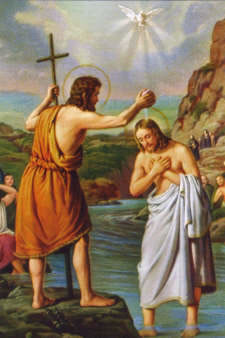
As I mentioned before, the ESV Study Bible has a really bad entry on the Trinity, part of its appendix called “Biblical Doctrine: An Overview.” Today, I note that it repeats something I’ve often seen asserted elsewhere. They write,
Perhaps the clearest picture of this distinction and union [of the Trinity] is Jesus’ baptism, where the Son is anointed for his public ministry by the Spirit, descending as a dove, with the Father declaring from heaven, “This is my beloved Son, with whom I am well pleased” (Matthew 3:13-17) All three persons of the Trinity are present, and each one is doing something different.
ESV Study Bible, page 2514a
This is an example of the intellectual laziness and sloppy reasoning that so mars contemporary theology. Think about it – how exactly is the unity of the Trinity displayed here – either their oneness of an individual essence (godhead, divine nature) or the sharing of a universal property of deity? Where exactly do we see portrayed here the absolute equality of the three, or the “full divinity” of the Son and Spirit.
This looks like a case of citing a passage that is merely compatible with your view as if that passage required the truth of your view.
Would anything in this episode cause trouble for, say, an “Arian”? Nope. Tritheists? No – they should be OK with coordinated actions by the deities. Consider those unitarians who think the Holy Spirit is a force or divine action, not a person in his own right. They won’t have any problem with this “descending as a dove” – which of course needn’t mean that a literal dove (or something that looks just like a dove) dropped from the sky. Finally, consider modalists (a.k.a. one-self trinitarians) who think that each person of the Trinity is really a personality of the one divine person, or a way that person acts. They’ll just say that this omnipotent, divine person can easily pull off these three actions simultaneously: getting baptized as a man, speaking from heaven, and coming down from heaven to empower the man.
The one sort of Christian theology that would trip hard over this baptism scene would be a strictly serial modalism – which holds that God acts, in sequence, as Father, Son, and Spirit, but only one at a time. But who holds this?
In sum, this episode, spiritually inspiring and important to christology though it is, is not very useful when it comes to arguing for or just finding evidence for any particular understanding of the Trinity. Theologians should be more nervous about just repeating these tropes. A narrative which is logically compatible with almost any view of the Trinity neither implies, asserts, assumes, nor even illustrates “the” catholic/orthodox/historical mainstream view of the Trinity.
Beyond this point, though, the passage can be seen to better fit some views than others. It seems to assume that the Father is one self and that the Son is another self. The statement from heaven certainly sounds like one self addressing another. The reader is supposed to think that speaker is God himself, and the recipient is obviously the man being baptized, the one relating to God through this ritual – the one who is God’s “Son.”
While the passage, I would say, is logically compatible with one-self/modalist views (conceivably, this could be one self, the triune God, talking to himself, as it were one mode addressing another), I think we should agree that it better fits a view on which the Father and Son are not the same self. Thus it would favor three-self or “social” interpretations of the Trinity over their one-self rivals. But it equally would support unitarian readings, on which the Father is the one God and Jesus is a special man, God’s Messiah.
And notice that nothing whatever about the passage requires seeing the descending “spirit” as an additional self – it doesn’t do anything which only a self can do, such as speak, perform an intentional action, or relate personally to another. Thus, it arguably better fits spirit-as-non-self unitarian views over views on which the Spirit is a self.